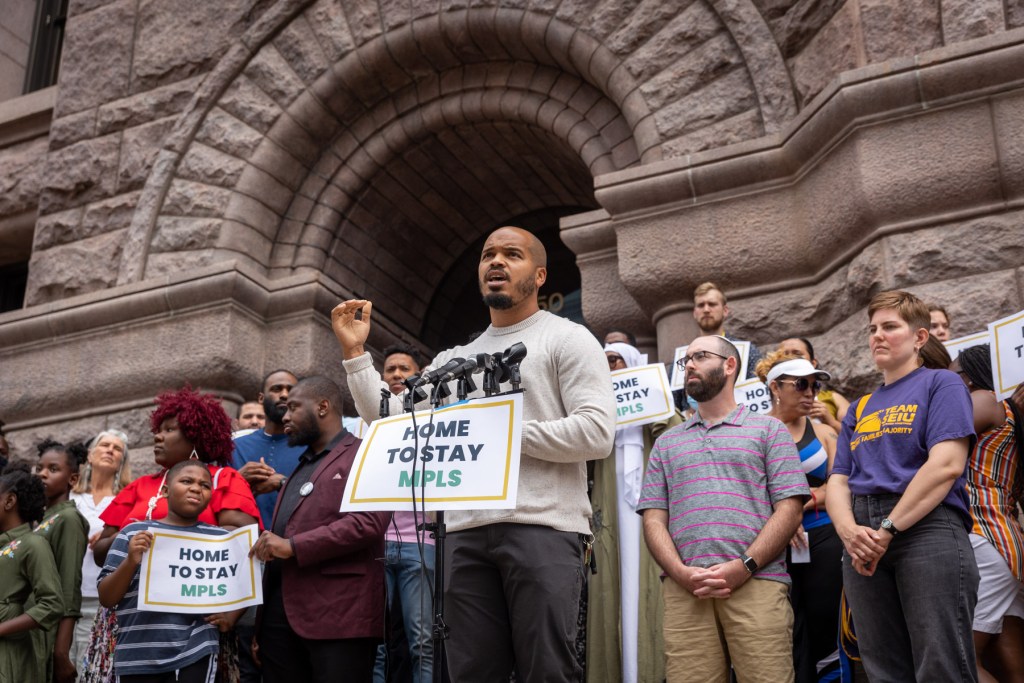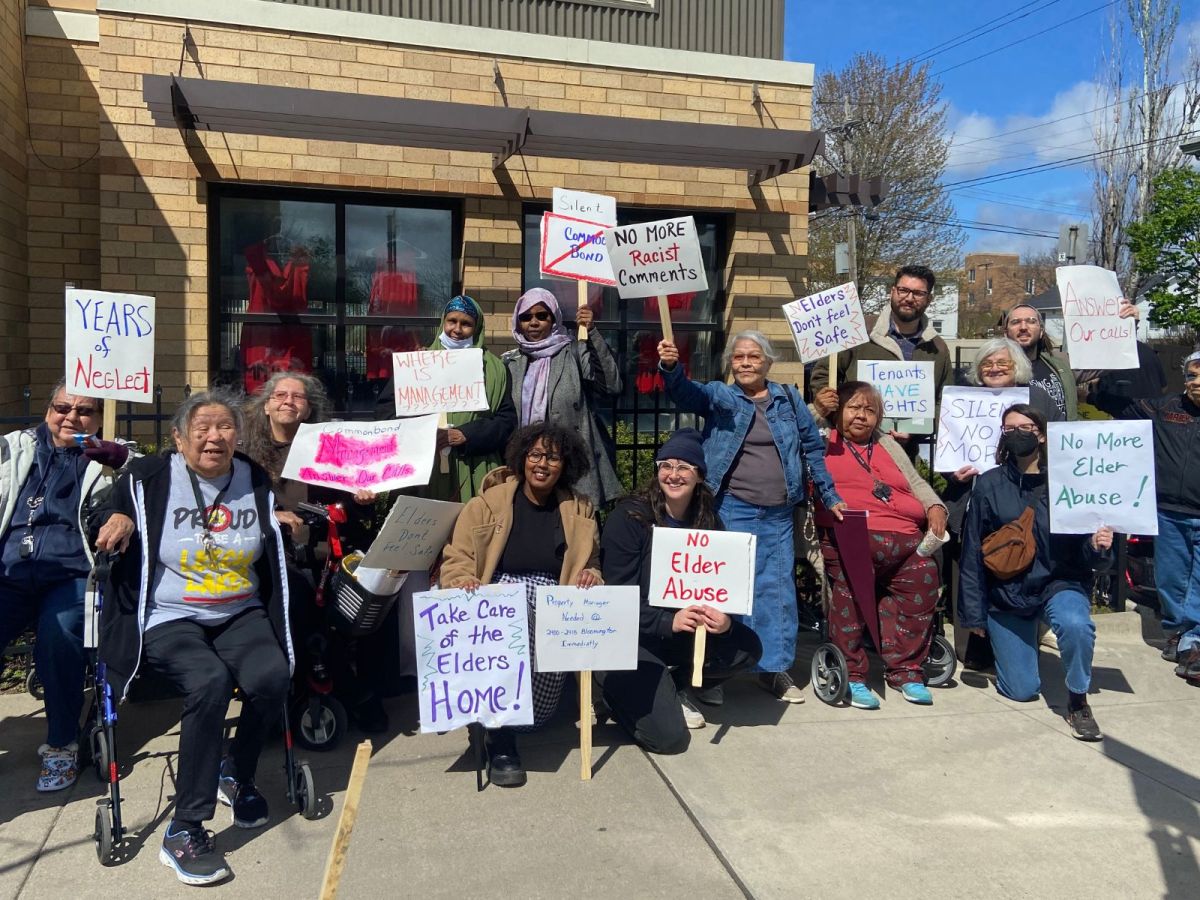The Minneapolis City Council voted Wednesday to kill work on a proposed rent control ordinance without input from three Muslim council members who were absent because of the holiday, Eid al-Adha.
The decision means Minneapolis voters won’t have a chance to decide this November whether the city should enact a rent control law. The council members who missed Wednesday’s meeting are pro-rent control.
“It makes me angry because three Muslim council members can’t be here voting in favor of a policy they support—two of the authors that are authoring this rent stabilization policy, because they’re spending time with their families, celebrating Eid,” Council Member Jason Chavez said after the vote. “That’s just wrong.
“I’m shocked that this even happened to begin with. So, I didn’t even see this beforehand, but I hope that sits well with everybody here today.”
The council members who were absent in observance of the Muslim holiday were Aisha Chughtai, Jamal Osman, and Jeremiah Ellison. They released a joint statement a few hours after the meeting, criticizing the vote as “inappropriate, purposeful, and exclusionary.”
“Rent Stabilization is out of reach for this year’s ballot. It’s a denial of our democratic process and obligation,” the statement said. “This is not transparent policymaking.
“Further, by taking this action at the expense of their Muslim colleagues, the Council took an action that not only neglected the will of the voters, but the manner in which they did it violated trust and understanding with a significant portion of our community. Reasonable people can ultimately disagree on the issues, but the alienation will linger. Our colleagues will have to figure out how they plan to repair this harm.”
The council voted 6-4 not to refer a draft ordinance on rent control to the Business, Inspections, Housing, and Zoning Committee, stopping the matter from moving towards possible implementation.
The six council members who voted against referring the draft ordinance were: Emily Koski, Michael Rainville, Linea Palmisano, LaTrisha Vetaw, Lisa Goodman, and Andrew Johnson.
Council members Elliott Payne, Andrea Jenkins, Jason Chavez, and Robin Wonsley voted in favor of moving the rent control process forward.
Had a majority of the council voted in favor of referring the draft ordinance, the city committee would have held public hearings on the proposed ordinance and amended the ordinance as needed. The council would have then voted whether to submit a final ordinance to the November 7 ballot, allowing voters to decide whether it should become law.
Chughtai, Ellison, and Osman vowed to continue fighting for rent control, and also called out city leaders for failing to plan ahead for Eid.
“Regardless of where you fall on the issue, the way this vote was taken today violates the spirit of inclusion Minneapolis prides itself on,” said their joint statement. “Muslims have been serving on the Minneapolis City Council for a decade now, and thousands of Muslims live in our city. Our holy days and celebrations are not unknown or mysterious.”

Determining Eid al-Adha
Basharat Saleem, the executive director of the Islamic Society of North America, told Sahan Journal in April that the date for Eid al-Adha is determined by the Supreme Court of Saudi Arabia, and is connected to the pilgrimage to the holy city of Mecca.
“That date is not fixed, because that depends on that pilgrimage and how that goes,” he said. “That date cannot be predetermined. Therefore, it has to be established about 10 days before the date of that Eid.”
He said in April that Eid al-Adha was tentatively scheduled for Wednesday, June 28. Last week on June 18, the Supreme Court of Saudi Arabia officially declared that Eid would fall on Wednesday.
City Council meetings are typically held on Thursdays. Chughtai, Ellison, and Osman said in a second joint statement that when the council voted last September on the dates for its 2023 meeting calendar, this week’s meeting was moved to Wednesday to accommodate Eid and Muslim council members and staff.
However, their statement said, the precise date of Eid al-Adha is determined by the lunar calendar, and early last week, the holiday was confirmed for Wednesday.
“Unfortunately, Council leadership decided against using their authority to reschedule this meeting,” their statement said.
Minneapolis City Clerk Casey Carl said at Wednesday’s meeting that he learned Monday afternoon that some of the council members would be absent. By that time, he said, it was too late to move the meeting.
State law requires a minimum of three days’ notice to change the scheduled time for a city council meeting, Carl said.
“This one unfortunately got missed,” he said. “And by the time that was brought to my attention, which was Monday afternoon this week, it was too late for us to change the calendar because under state law, we must give a minimum of three days notice to change a meeting by Monday afternoon.”
Council Member Robin Wonsley tweeted her disappointment after Wednesday’s meeting.
“Deeply disappointed in my colleagues on council today,” she wrote. “The choice to move forward with today’s rent control vote while three of our members, including the two bill authors, were out honoring Eid is a disservice to them and the people of Mpls, particularly our Muslim residents.”
Second vote against rent control
Immediately after the first vote Wednesday, the council voted 5-4 against implementing rent control under a motion Chughtai and Osman successfully passed during a May 25 City Council meeting. The policy Chughtai and Osman proposed would have capped rent increases at 3 percent each year.
Johnson abstained in the 5-4 vote. The split in that vote matched the council’s division in the earlier vote, with Chavez, Jenkins, Payne, and Wonsley again voting in favor of rent control.
Johnson said Wednesday that he supports rent control, but does not agree with the parameters outlined in Chughtai and Osman’s proposed ordinance, so he abstained from the second vote.
“I have concerns around the impact around the timeline and our ability around continuing the conversation this year, which I think is important that we continue that work. I don’t think this work should be pushed off in that regard,” Johnson said. “I also am sad that we don’t have three of our colleagues here today that clearly have an opinion on this topic and are not able to be here with us today on this.”

City Clerk Casey Carl said Wednesday’s two votes effectively put a stop to the council’s work on rent control for the remainder of the year. There isn’t enough time to restart the process, Carl said.
City council members have until August 25 to put a final ordinance on the November ballot, a process that requires multiple steps, public hearings, making amendments to a draft ordinance, and holding a city council meeting to vote on a final ordinance.
“The difficulty I would express is that there is little, if any, time left for the council to consider a policy this year,” Carl said at Wednesday’s meeting. “In that again, it takes about two months. We would have to start the process again.”
Payne tweeted his criticism of the two votes.
“I’m ashamed at the way rent stabilization was voted down today,” Payne tweeted. “This vote was to stop a policy from being forwarded to committee for further discussion and deliberation before eventually being sent to the voters on the ballot.
“Earlier this term City Council unanimously voted to form a workgroup with renters, landlords, and developers that brought forward this policy. It’s outrageous that City Council is now killing this policy before it can even go to committee.”
Division on rent control
Last month, Chughtai and Osman introduced a motion calling for a strong rent control policy that caps rent increases at 3 percent annually and creates a compliance body to enforce the ordinance, among other measures. The rent cap would apply to all Minneapolis rental properties. The motion passed on a 7-5 vote.
Council members have debated rent control for more than two years, but they continue to be divided on the hot-button issue. Since Wednesday’s vote was to refer a draft policy rather than a completed policy, some council members expected it to pass.
“If we don’t get to consensus this year, then we’re going to have to wait until next year, and, you know, that may be the place where we end up,” Chughtai said in an interview with Sahan Journal before Wednesday’s vote. “But it’s important to at least advance an issue that, at the beginning of this term, we said was a priority.”
Chughtai represents Ward 10, which she said has the second-highest percentage of renters in the city.
She emphasized in the May 25 City Council meeting that time was running out for the council to put a rent control ordinance on the November ballot. She urged them to take swifter action.

But council member Johnson said in an interview with Sahan Journal prior to Wednesday that the motion is too narrow and doesn’t consider the nuances of long-term issues with rent control. He voted against the motion in May.
Johnson said a strong rent control ordinance would result in declining housing supply and would incentivize landlords to raise rents to the highest amount allowed. He added that rent banking is not included in Chughtai and Osman’s motion.
Rent banking gives landlords the option of keeping their rents the same for a number of years in order to “bank” them, and then to increase rents in one year based on the amount they’ve “banked.” Johnson hopes to change that.
The “no rent banking” component of the rent control policy will end up hurting renters in the long run, Johnson said. For example, he said, under the proposed rent control ordinance, landlords who fear losing income over time would be incentivized to raise rent by 3 percent every year even if they normally would not.
Some of the council members, including Wonsley and Chavez, say they want the strongest rent control policy to pass to ensure renters won’t fall through the cracks.
“When we look to the unintended consequences of rent stabilization in other communities, the places where communities have passed weaker rent stabilization policies with lots and lots of exemptions built into it—that’s what results in greater displacement, greater gentrification,” Chughtai said. “When we build in strong policies, they work.”
Council Member LaTrisha Vetaw voted against Chughtai and Osman’s motion. Many of the constituents in her ward, she said prior to Wednesday, live in single-family homes or do not rent long-term. Based on conversations with renters, Vetaw said the root cause of problems facing renters in her ward would not be solved with rent control.
“The people in my ward need supplemental income. They’re making low rates, right, even with $15 an hour, that’s not going to benefit them,” Vetaw said. “We need more opportunities for people to get some type of supplement to offset what they have to pay for rent.”
Council Member Elliott Payne said prior to Wednesday that rent control can be one of many tools that effectively tackle housing issues.
“Housing is a crisis, and we have a major issue around the encampments and unsheltered homelessness,” he said. “We have major crisis around opiate-use disorder. And all of these things are interrelated.
“And we can’t have these solutions at the margins where we’re just trying to incrementally do these small things. The scale and scope of our interconnected crises require a scale and scope of response that I think we’re currently missing, so we really need to step up and meet this moment.”









